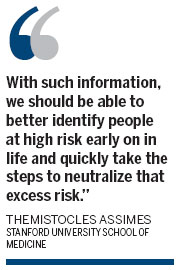Health
New gene finds point to heart disease risk
Updated: 2011-03-09 08:01
(China Daily)
 |
Scientists have found 13 new gene variants that increase a person's risk of developing heart disease, the world's No 1 killer, in a series of large-scale international genetic studies.
The discovery of 13 previously unknown gene variations and the confirmation of about 10 more should offer clues about how heart ailments, such as coronary artery disease, develop, and lead to new and more effective treatments, the researchers say.
The findings also suggest it may be worth mapping someone's profile of genetic variants for heart problems as part of routine clinical care in the future, with an eye to being able to offer more personalized prevention or treatment plans.
"With such information, we should be able to better identify people at high risk early on in life and quickly take the steps to neutralize that excess risk," says Themistocles Assimes of Stanford University School of Medicine in the United States, one of many scientists across the world who worked on the study.
"Although we are inching closer to that day, we will probably need to reliably identify many more variants ... over the next few years before it becomes useful to perform this genetic profiling in a doctor's office."
According to the World Health Organization (WHO), cardiovascular diseases are the world's largest killers, claiming 17.1 million lives a year. Billions of dollars are spent every year on medical devices and drugs to treat them.
Lifestyle factors, such as smoking, drinking alcohol, unhealthy eating and a lack of physical exercise, are known to increase the risk of heart attacks and strokes.
But scientists also have been examining DNA maps to find genes that may also put people at higher cardiovascular risk.
For this study, an international consortium analyzed data from 14 previous so-called genome-wide association studies, which scan people's genetic profiles.
Combining data from multiple studies is critical to finding gene risk variants, as the genetic architecture of heart diseases is very complex.
"The signals from these gene regions are all rather subtle, making large-scale collaborations a prerequisite for any meaningful progress," Assimes says.
Researchers say their results show that: Of the total of 23 variants now known, seven are linked with levels of "bad" or LDL cholesterol and one is linked with hypertension, or high blood pressure - both known risk factors for heart disease.
But the others have no relation to known cardiovascular risk factors - a finding the scientists say opened up new opportunities for future research and discovery.
"The lack of apparent association with the risk factors we know so well is the source of a lot of excitement concerning these results," says Sekar Kathiresan of Massachusetts General Hospital in the United States, who worked on the study.
"If these variants do not act through known mechanisms, how do they confer risk for heart disease? It suggests there are new mechanisms we don't yet understand," Kathiresan says.
Reuters
E-paper

Rise and shine
The Chinese solar energy industry is heating up following recent setbacks in the nuclear sector
Bombs aim for regime change
CSI, with a twist
Literary path
Specials

Peony express
Growers of china's unofficial national flower are reaching out to europe for help

Tea-ing up
More turning to Chinese tea for investment opportunities like vintage wine

A cut above
The ancient city of Luoyang is home to a treasure trove of cultural wonders.
